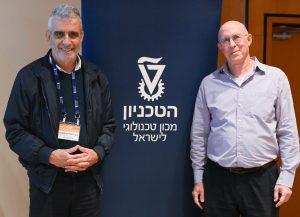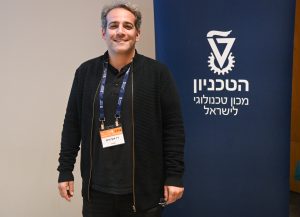When Archaeology Meets the Exact Sciences
First of its kind collaboration between the University of Haifa and the Technion
On Wednesday, January 18, the Technion – Israel Institute of Technology and the University of Haifa held a scholarly conference as part of a first-ever collaboration on the subject of technology and science in the study of archaeology and maritime cultures. The research collaboration, which has already begun at both universities, will propel the study of the past into the era of modern technology.
According to Professor Israel Finkelstein, head of the School of Archaeology and Maritime Cultures at the University of Haifa, “These days, there is no archaeological research without exact sciences and technology – beginning, of course, with radiocarbon dating and including isotope analysis to identify the origins of metals, genetic sequencing to determine the origins of people who lived long ago and studying molecular remnants in clay pots to track early trade routes. At the University of Haifa, we are opening an Archaeological Science Department and nothing is more natural than collaborating with the researchers at the Technion, who are located just a short cable car ride away. This collaboration will boost our understanding of the past and of historical and social processes that occurred here thousands of years ago.”
Professor Kobi Rubinstein, Executive Vice President for Research at the Technion, said that, “Archaeology might be the most fascinating profession I know. Few people are interested in my field, Mathematics, but Archaeology affects a very large group of people because it teaches us who we are and what we are. Research in this field deals with the smallest details, but can not make progress without creating – and seeing – the larger picture, even when it is clear that some of the pieces of the picture are missing. Therefore, I was delighted when the rector of the University of Haifa suggested that we cooperate in this field, and I wish everyone much success with the conference and with the collaboration.”
In recent years, archaeological studies have developed into multidisciplinary research field that combines advanced scientific and technological tools with traditional archaeological methods. DNA analyses of bones and other organic substances such as plants, observations of sediment under a microscope to understand economic patterns in ancient sites, chemical and molecular analyses to determine the origins of tiny cotton fibers, and the use of powerful microscopes to reconstruct ancient techniques have all become an integral part of archaeological research. Innovative methods enable researchers to build three-dimensional models of ancient sites, discover lost secrets thanks to innovative laser scanners, and use AI and deep learning to create Big Data databases that amass enormous amounts of information from the profusion of findings that have already been discovered.
“These techniques, which are based on technologies at the forefront of science, are also used in the field of biological anthropology to study human evolution, so the collaboration between the institutions on archaeological research is a synergy in our endeavor to study the human past,” adds Dr. Assaf Marom, head of the Anatomy and Human Evolution Lab at the Technion’s Rappaport Faculty of Medicine, who is leading the collaboration on behalf of the Technion.
The collaboration will harness the unique skills of the researchers at both institutions in order to conduct cutting-edge interdisciplinary research, especially given the enormous wealth of archaeological discoveries in Israel. For example, Professor Guy Bar-Oz of the University of Haifa is working with Professor Sima Yaron, dean of the Faculty of Biotechnology and Food Engineering at the Technion. Prof. Bar-Oz is in possession of numerous chicken eggs, some of which are thousands of years old. Together with Prof. Yaron, he is attempting to determine when and how salmonella bacteria passed from chicken eggs to humans, and how our forefathers dealt with the new disease. Professor Deborah Cvikel of the University of Haifa and Professor Moris Eisen of the Technion’s Schulich Faculty of Chemistry are collaborating in an effort to understand how early seafaring people used sails and how they protected the sails from the ocean’s humidity and salt and made sure they would be sufficiently strong and flexible.
The joint conference officially launched the collaboration between the two institutions. An “Introduction to Archaeology” course will soon be offered as part of the Technion’s Department of Humanities and will be taught by researchers from the University of Haifa’s School of Archaeology and Maritime Cultures, in order to impart the foundations of archaeology to Technion students during their undergraduate studies. The course “Evolution of Humans,” which will be offered at the Technion and will be open to students from both universities, also promotes the partnership. In the future, research students will receive grants for research projects that combine archaeology and science.
“This collaboration is the beginning of a process that will enable us to better understand the past, and it will turn Haifa – with its two prominent research institutions – into a global hub for researching the history of humanity,” the partners concluded.







